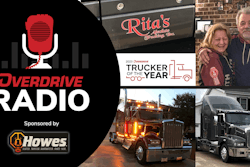Talk to an owner-operator or other trucker long enough about the Federal Motor Carrier Safety Administration's moves toward a mandate for speed-limiter use, and you're highly likely to hear safety, congestion and other operational concerns. Yet there's another objection amongst the most commonly proffered. That's the feeling that the FMCSA and others pushing a limiter mandate on safety grounds are fundamentally getting their priorities wrong.
This week's edition of Overdrive Radio kicks off with K&D Transport operator Andrew Axelson, speaking from the site of the Mayberry Truck Show in Mt. Airy, North Carolina, late last month. "Instead of limiting the speed on trucks, they should really limit the speed on cars," he said. That's where he contends most of the outlandish speed issues on American highways today sits.
As Overdrive contributor Clifford Petersen once put it:
Professional truckers are not the problem. Excessive speeding by automobile operators is. If government is going to limit the ability to speed, start with cars.
 Overdrive Radio's sponsor is Howes, longtime provider of fuel treatments like its Howes Diesel Treat anti-gel to get your ready for winter, likewise its all-weather Diesel Defender, among other products.
Overdrive Radio's sponsor is Howes, longtime provider of fuel treatments like its Howes Diesel Treat anti-gel to get your ready for winter, likewise its all-weather Diesel Defender, among other products.

This podcast round up of viewpoints on the FMCSA's move toward a speed limiter device mandate for in-use trucks follows September news from the Department of Transportation’s regulatory calendar update that seemed to suggest FMCSA had settled on a 68-mph speed setting for its planned a mandate. When Overdrive's Matt Cole got that news, I was immediately reminded of the time in 2012 when the federal agency appeared to be proposing a fairly stringent sleep apnea screening restrictions as official regulatory guidance, only to almost immediately retract that, citing a “clerical error” after the restrictions were published in the Federal Register for comment:
Among other things, those apnea-screening restrictions would have required any trucker with a body-mass-index measure of just 35 (or above) to undergo apnea testing as a condition of getting a medical card. The notion that this could be bona fide guidance set off shockwaves around trucking. Congress soon after forbade the agency to change official sleep apnea guidance or regulation through any process other than formal rulemaking.
When it comes to a speed-limiter mandate today, somewhat similar dynamics are play. As with changes to the sleep apnea approach back then, it’s clear FMCSA wants to move on a mandate for speed-limiter use, yet at what speed setting is to be adopted has remained the big question for quite some time.
 Subscribe to the podcast on your listening platform of choice for early access to the weekly Overdrive Radio series -- it drops typically every Friday to the feed and follows here at OverdriveOnline.com and in Overdrive's Youtube and Facebook feeds the following week. You can subscribe for first access via Apple and Google podcasts, Spotify, TuneIn, most anywhere you listen.
Subscribe to the podcast on your listening platform of choice for early access to the weekly Overdrive Radio series -- it drops typically every Friday to the feed and follows here at OverdriveOnline.com and in Overdrive's Youtube and Facebook feeds the following week. You can subscribe for first access via Apple and Google podcasts, Spotify, TuneIn, most anywhere you listen.
In this podcast, we drop into the scene around the Mayberry Truck Show, at the end of last month just after the latest speed-limiter news emerged. Overdrive video editor Lawson Rudisill found that the 68-mph news traveled fast, and gathered a bevy of views from owner-operators and other truckers in attendance. Take a listen:
[Related: Another push to block speed limiters emerges in Congress]
Andrew Axelson: Instead of limiting the speed on trucks, they should really limit speed on cars. 85% of crashes between cars and semis are caused by cars.
Todd Dillis: When I saw the news Overdrive's Matt Cole had picked up via the Department of Transportation's regulatory calendar update late last month, namely that FMCSA seemed to have settled on a 68-miles-per-hour speed setting for its planned proposal of the speed limiter mandate for in-use trucks by the end of this year. Well, when I saw that news, I was immediately reminded of the time in 2012 when FMCSA appeared to be proposing to adopt fairly stringent sleep apnea screening restrictions as official regulatory guidance, only to almost immediately retract that, citing a "clerical error" after the restrictions were published in the Federal Register for comment.
Those apnea screening restrictions would have, among other things, required any trucker with a body mass index measure of just 35 to undergo apnea testing as a condition of getting a medical card. The notion that this could be bona fide guidance set off shockwaves around trucking, and Congress soon after forbade the agency to change sleep apnea guidance or regulation through any process other than formal rulemaking.
When it comes to a speed limit or mandate today, somewhat similar dynamics are at play. As with changes to the sleep apnea approach back then, it's clear today that the agency wants to move on a mandate for speed limiter use. Yet, what speed setting is to be adopted remains the big question. FMCSA quickly retracted the language suggesting the 68-mile-per-hour speed setting we reported, among other details from the DOT regs calendar.
But also, as with the apnea "leak" in 2012, the shockwaves have continued to ripple out. I'm Todd Dillis, and in today's edition of the Overdrive Radio podcast, we drop into the scene around the Mayberry Truck Show in Mount Airy, North Carolina, which happened at the end of last month just after the latest speed limiter news emerged. Overdrive video editor Lawson Rudisill found that the 68-mile-per-hour news traveled very quickly, and gathered a bevy of views from owner-operators and other truckers in attendance at the truck show.
The first we'll hear from today is operator Andrew Axelson. You heard a little from him up at the top of the podcast. Axelson was on hand at the event, showing one of small-fleet champ finalist K&D Transport's custom Kenworths. The longtime trucker's commentary distills a lot of owner-operator opinion around the subjects of speed limiters generally, from safety and congestion concerns to worries over misplaced attention to trucks, when clearly, the main speeding problem on the roads today is with the speeding of our four-wheeled friends and colleagues.
Andrew Axelson: I think it is the biggest mistake that the FMCSA could do. Just like when they implemented e-log, it didn't make trucking safer. It makes guys rush more. And if you limit all trucks to 68 miles an hour, the country's going to be in gridlock, because no trucks are going to be able to pass anybody. It's just going to be one long line of trucks going down the interstate. In my personal opinion, instead of limiting the speed on trucks, they should really limit speed on cars.
85% of crashes between cars and semis are caused by cars, and it's not the semis that are causing them, it's the cars. I mean, cars speed by us, they jump in front of us, they hit the brakes. We're 80,000 pounds, we don't stop on a dime, and a lot of people don't realize that. And the FMCSA, they don't want to look at that. They don't want to listen to drivers that have been doing this for 20, 30, 40 years. They want to listen to the politicians and make everybody happy saying, "Well, we got to regulate the big trucks, we got to slow them down. They're causing this and they're causing that," and we're not.
I mean, during COVID, truckers were the heroes. Everybody treated us like we were heroes. COVID was done and we're back to no respect, nobody cares about us. But whenever there's a natural disaster and they need trucks, well then the FMCSA will just throw all the rules out the window. "Okay, you guys don't have to run log books. You can run as many hours you want. You got to get relief supplies here." I don't think that's right. They got to listen to us drivers. Nobody in the FMCSA has probably ever driven a truck. They don't know. They have no idea what it's like and it would wreck the trucking industry if they do this.
Todd Dillis: With all the attention operators are putting on the possibility of a speed limiter mandate coming as early as December of this year, I do suspect the FMCSA is hearing truck drivers now. Whether they're truly listening is another matter though. On the other side of a break, we'll dive into a round of views from five other owners and operators Lawson Rudisill spoke to out at the Mayberry Truck Show, so keep tuned.
Speaker 3: Stop fuel from gelling this winter with Howes Diesel Treat, North America's number one trusted anti-gel. Right now, you need Howes Diesel Treat more than ever. Not only to keep your gel free, but to fight the shortcomings of today's ULSD, by adding vital lubricity, removing water, and preventing deposits. The only guaranteed anti-gel on the market, Diesel Treat also boosts fuel economy and improves performance. This winter, do yourself a favor and add Howes Diesel Treat at every fill-up. Visit howesproducts.com for more information.
Todd Dillis: Stock up on Howes Diesel Treat for the winter weather coming fast here this fall, 2023, via H-O-W-E-S, howesproducts.com. Okay, first up, Mr. Chase Baker, a mobile home toter with a YouTube presence with Left Lane Media, who showed at Mayberry. While Baker might not be affected on many of his hauls by any speed-limiting device, given his oversized runs are often enough limited at speeds well below the posted limit, he worries about both safety and other impacts that have move to mandate widespread speed-limiter use. He references that 68-miles-per-hour figure specifically in his commentary.
Chase Baker: I think that a 68-mile-an-hour speed limit would just be completely unacceptable on trucks. I know there's a lot of big, mega carriers, they have speed governors on their trucks already and this and that. But I think for the day-to-day operation, that you have all the trucks out there going 68 or 65 or whatever they end up on, and you have cars blowing your doors off at 75-plus. I mean, I haul oversize mobile homes and a lot of our speed limits are 55 in some states. And it's so hard to keep up with traffic and people cutting you in and out, cutting you off. It's just dangerous to be running that slow on the highway these days.
I think that the posted speed limit should be the posted speed for the trucks. I mean, I don't necessarily think that just because there's companies that want to save on insurance, that that should ruin it for everybody else. And not everybody can turn the money that big, mega carriers turn, because it doesn't matter if they make six cents for the day or they make $200 for the day, they're still making money, but it's just the small guys that they're trying to hurt when they do a speed limit. Same thing with ELDs, I think.
I personally think that it'll be less safe and less productive, because if you are running 68 miles an hour and the next guy is running 68 and a half miles an hour, because his truck's speedometer is a little bit off, and you're running side-by-side down the highway and you have a lit long line of cars trying to pass everybody, I mean everybody sees it how people drive these days, everybody's impatient. And I think that it would be more dangerous because of cars on the road and people's impatience trying to pass trucks.
And then, I think it'll limit productivity for sure, too, because people will be rushing to get done faster, because they might not make it to their destination, because they can only run 65, 68, and then they get shut down in the middle of the highway with e-logs and 68-mile-an-hour speed limit. But I think it's just a no-go all the way around, my opinion. There needs to be regulations, but I think that there needs to be less regulations on a lot of things.
And I think that people are going to be responsible, they should be responsible, and we should be held to a higher standard. I think the trucking industry seems to go downhill a little bit on the standards of quality of drivers and safety. I think if everyone just took it upon themselves to be safe, the industry would be a lot better off, I think. This is Chase Baker, Left Lane Media. I got my own YouTube channel. I just started. It's all about mobile home hauling and cool trucks. And yeah, Left Lane Media. We're on Facebook, TikTok, Instagram, YouTube, just started up, so give it a checkout.
Todd Dillis: Next up, trucker Michael Gerber who painted a picture of a self-fulfilling prophecy game he feels may be at work in the last decade of regulation, starting with the ELD mandate. A predictable follow-on effect of hard-and-fast time limits enforcement? Here's how Gerber put it.
Michael Gerber: Well, I think the biggest thing doing the e-log mandates has actually made people drive crazier and more reckless because of the racing the clock. Now they want to do speed limiting yet. I'm familiar with the laws. They've had that up in Canada for a while. It's dangerous. I don't think it's necessary. Everybody knows they're not supposed to speed, so just quit speeding.
Todd Dillis: Gerber noted a speed limiter mandate generally was "for the birds." Yet, on the other hand, if the speed decided upon is 68 or above...
Michael Gerber: I actually have no problem with that. This is a C16, 600-horse, 18-speed. I can easy do three digits, but I honestly set my cruise at 68 and that's where I go. I find it the most comfortable, the safest for me. And I suppose if they want to make that rule at 68, knock themselves out, because that's basically what I'm running anyway. It's just, I don't think it's right and it's not cool, because you can't get out and pass someone that's heavy or going slow or whatever.
Todd Dillis: Next, we'll hear from trucker Josh Czebutal, who leaned back on the posted speed, too, in his commentary. If technological speed-limiting devices are to be required equipment, they ought to be able to adjust to posted limits. The technology for which does in fact exist, though requiring that sort of thing might present added costs for truck makers and truck owners. Zibital in general, as you hear, views any other arbitrary speed setting as simply unsafe.
Josh Czebutal: Everyone being stuck at a certain speed limit, you're not going to be able to pass each other and traffic's going to get longer. They already have problem with trucks not being able to pass other trucks, because they're stuck at a certain speed as it is. I just don't think it's a good idea. They just need to leave it like it's always been. Long as everyone goes speed limit, no matter what it is. Out west, is 80 mile an hour, East Coast is 65, 70, so everyone should be able to do whatever the speed limit is wherever they're at in that area. It's dangerous if you're going 68 mile an hour and West coast is 80 mile an hour, you're going to have accidents. And that's not trucker's fault, that's government's fault. It'd just be dangerous. I just don't, I don't see how that's safe, honestly.
Todd Dillis: Bedrock safety also dominated the commentary of trucker Jack Gray.
Jack Gray: I think it's a horrible idea. It's disastrous. When you start governing these trucks like this, especially when they're driving in mountainous terrain, they can't pull the hills at the minimum speed limit, and foggy rainy conditions and stuff, it just asks for accidents. Now, I'm not saying trucks should run a hundred mile an hour. I think that trucks should be able to compensate and work and be able to run a safe speed limit, but that's all in with the driver's stuff.
A lot of new drivers and stuff, these companies and stuff, I think they should provide more on-hands training before they put people in these trucks. You should be able to drive according to conditions. Sometimes you have to be able to pull and keep the speed limit up the mountain so you don't get run over, fog, rain conditions. Sometimes you just need to get away from other drivers that puts everybody in bad positions and dangerous situations. And I'm not saying everybody's going to run a hundred miles an hour, but you should be able to do the least of it. You should have enough power to do the minimum speed limit that's safe for everyone.
When you start governing trucks at 65, 68 mile an hour, they can't maintain those speeds on mountainous terrains, hills, and stuff like that. I've been driving for 20 years and I have a clean driving record, knock on wood. I don't have tickets. I don't run up and down the road wide open, but I'd run what I need to run to be able to do the job safely and timely.
The states pretty well, DOTs pretty well know what's the safe speed limits that they post for all kinds of vehicles, such as cars, trucks, and everything. I think you should be able to run what speed limit that's posted. I just think it's a horrible idea. I think they just really want to do it to try to maintain fuel savings, to be able to write the tickets and stuff. I think it's a money racket. That's basically my honest opinion. If they're really concerned about my wellbeing, then why if I was to get a speeding ticket, it would be a monetary fine and not something up.
Todd Dillis: And finally, Matt Yandell, like others, objected to the notion of mandating speed limiters. Yet, at once offered a figure above the recently highlighted 68 miles per hour as the best approach for safety and congestion minimization, if, that is, the FMCSA is in fact set on mandating use of the devices.
Matt Yandell: Hey, if you think about it, they've governed all these trucks through insurance companies as it is, and most of the interstates in this country are two-lane interstates, both directions. And if you've ever been going down the interstate with two trucks trying to see who can run 68 miles an hour the fastest, you get stuck there for a while. And just imagine every truck in the country that runs that speed what it's going to do to the... I mean, not the infrastructure, the traffic. It's going to back traffic up for miles.
And the way they've got these trucks governed, it's all a lot of these trucks can do to get out of their own way and climb hills and all that. I think if they do that to every truck, it's just going, it's going to be stupid. Freight's going to get late. Freight rates are already down as it is. You're already in a rush every time you go anywhere. I don't think it's a smart idea. Every truck needs to be able to at least run the speed limit. Most of the speed limit through the US is 70 miles an hour. I think every truck should at least be able to run that. If they can run faster than that, 75, that's great.
Because if you've got to get out and you've got to go around somebody that, say, they can't pull a hill as fast as you, you can get out there, you can get around them, and you can get back over into the right lane where you need to be and you can free up that left lane. Not every truck runs down the road weighing 80,000 pounds. There's some that run down the road that they got 5,000 pounds in the box, some have got 45,000 pounds in the box.
So some can pull hills better than others, whatever. But it's just, I think at least 70, and if they can go 75 to be able to pass, I think that's what it needs to be. I just think speed limiters, they say it's to improve fuel economy and all that stuff. I don't think it saves enough fuel on tires to justify slowing the entire country down that way.
Todd Dillis: Here's a big thanks to Matt Yandell and all the owner-operators who spent time with Lawson Rudisill to share their views at the Big Mayberry Truck Show, Mount Airy, North Carolina. You can find a link to Rudisill's video of the big benefit convoy for a Winston-Salem Children's Hospital. Likewise, a full walk-around at the show, via the show notes for this podcast.
Also, there you'll find a link to that speed limiter report from a few weeks back, detailing the confusion around FMCSA intentions as it relates to a potential mandate, particularly with regard to the 68 miles per hour speed. Find it wherever you're listening. Overdrive Radio's on Spotify, SoundCloud, Apple, and Google Podcast, Tune-in, most any platform. Subscribe so you don't miss an episode, and if you're enjoying these, leave us a rating and review there. Big thanks for that.










